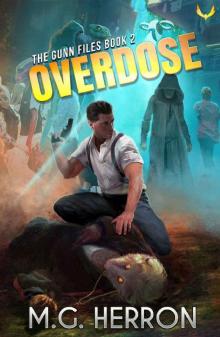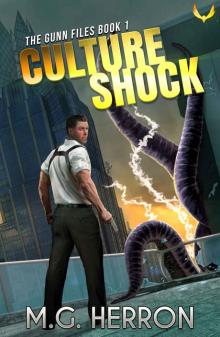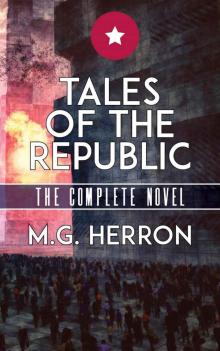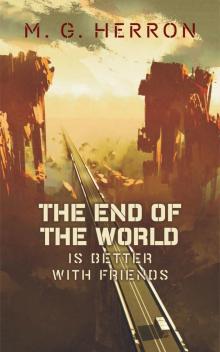- Home
- M. G. Herron
Tales of the Republic (The Complete Novel)
Tales of the Republic (The Complete Novel) Read online
TALES
OF THE
REPUBLIC
M.G. HERRON
Tales of the Republic (The Complete Novel)
Copyright © May 2017 by M. G. Herron. All rights reserved.
This is a work of fiction. Any resemblance to actual persons living or dead, businesses, events, or locales is purely coincidental. This story may not be reproduced without express written consent.
M.G. HERRON’S STARTER LIBRARY
Looking for more fantastic fiction? Click here to get a bunch of free stories from M.G. Herron!
TABLE OF CONTENTS
TALES OF THE REPUBLIC
Episode 1: Stolen Choices
Episode 2: Lost Memories
Episode 3: Perilous Journey
Episode 4: High Crimes
Episode 5: Reluctant Rebel
Episode 6: Early Warning
Episode 7: Killer Cause
Epilogue: New Life
MORE
About the Author
Also by M.G. Herron
Episode 1
STOLEN CHOICES
CHAPTER 1
NO MORE LIES
Commissioner Kai Ming stood in the wings of the hastily assembled stage and sweated through his suit. The air in the crowded market square was thick—not just with the damp heat of a late summer afternoon, but with the palpable tension of unrest.
Magistrate Alber tried to speak to the gathered assembly of concerned citizens from a podium at center stage. When his frail voice lost itself among the noise of a plaza packed with restless people, the magistrate glanced back at Ming, and his wrinkled face furrowed with frustration.
Ming showed his palms and flicked his hands skyward. Louder, man, he thought.
The magistrate put his mouth closer to the microphone and cleared his throat. “Thank you all for coming.” The audio projection squealed and faded. A hush fell over the square. “I know this has been a difficult month for all of us.”
Ming winced. A poorly worded start. He should have been at the podium, giving this speech himself instead of that frail old man. With protests bogging down the city and the hunger crisis worsening, the home office extended the Magistrate’s retirement with the claim that they favored a slow transition in this unstable time. The old man had been serving for over forty years—nearly the entire lifespan of the young Republic. What they didn’t realize was that frail, old Alber had lost his edge. And, for some exasperating reason, public speaking was one part of the job that he’d never been good at to begin with—even less so now.
On Ming’s left, Ari Klokov shifted his weight. A tall ex-army scout of Slavic origin, Ari was one of several specialists recently brought on for additional security at the Fields prefecture. The broad-shouldered European stood as he always did, with his hands clasped behind his navy blue suit jacket in a relaxed but ready posture. Ming also noted that he appeared as unfazed as ever. Sometimes having a bodyguard shadowing your every move was cumbersome, but today Ming found his presence comforting.
A man and a woman in navy blue suits just like Ari’s stood on the opposite side of the stage—Alber’s bodyguards. They kept the magistrate in their line of sight and scanned the crowd with eyes hidden behind dark glasses.
Magistrate Alber continued. “The Agricultural Committee has authorized the installation of two additional Ration Distribution Centers here in Greyhare Market.” A murmur ran through the plaza. “It will be up and running by next week.”
The magistrate paused to catch his breath. Boos and jeers clamored up above the murmur of the restless crowd.
“I’ll believe it when I see it!” a man’s voice, distant but strong, called out.
“Who’s going to wait in line for me while I’m at work?” a woman asked. Her voice came from the left.
“You look like you ate more for breakfast than I’ve eaten all week!” This voice was the closest, and a tense laughter followed.
“Settle down!” the Magistrate croaked. “Please, now is not the time for questions.”
Ming clamped down a snort of derision and forced himself to keep his face impassive. Do those sound like questions to you?
After the bitter thought crossed his mind, Ming knew he was being unfair. It was not Alber’s fault that a genetic disease had decimated the year’s scant rice harvest.
The food shortage hit the whole city hard, but Fields bore the worst of it. In summers past, the stores in this market teemed with produce. Smells of roasting meat and freshly baked bread once mingled with the steady flow of commerce. Now, half the vendors had shuttered their doors. A few of the more successful shops moved to wealthier areas, but most were forced out of business due to skyrocketing food prices and sinking wages.
Today, the square held no food, no open vendors, no smells of cooking, only thin people with black bags under their eyes and lips pressed into pained sneers. In their place, Ming, too, would have been outraged to hear that his market was being turned into a Ration Distribution Center. And yet what else could be done? The population of this district continued to swell. Over a hundred people per day migrated to Fields from the broken, depressed districts at the country’s western and northern borders. And that was just one district’s numbers. There wouldn’t be enough food for everyone during the hard winter to come without strict rationing now.
A magistrate could only do so much.
Gazing into the crowd, Ming watched as a tall, grim man pushed his way to the front of the stage, where a row of waist-high metal fences lined with wary police officers separated the crowd from the politicians. The stranger had close-cropped jet black hair and a face so lean his cheekbones cast shadows. He was close enough that Ming could see the scar on his right ear—ragged and torn at the top like someone had tried to bite it off in a cage match.
At the rail, a balding man with a wide, flat nose glanced behind him, saw the tall grim man as he approached, and seemed to puff up as if dosed with a shot of courage. Flat Nose spun and shouted into the face of the police officers. “It’s not enough, Alber! My children are starving!”
Two helmeted officers shoved the man back into the crowd.
“The austerity measures affect us all,” Magistrate Alber said. “We must pull together in this time of crisis.”
“Bullshit!” Flat Nose hollered as he scrambled back to his feet.
“More lies,” said another voice that Ming couldn’t place.
The tall grim man said nothing. He watched the Magistrate with an unwavering gaze.
Ari shifted his weight. A full head taller than Ming, he had to bend down to speak in the older man’s ear.
“Commissioner,” Ari whispered, “we may need to leave in a hurry, sir.”
Ming covered his mouth with his hand. “Eyes ahead, soldier,” he said, though he trembled with fear.
The floor of the stage gave ever so slightly as Ari readjusted his feet and unbuttoned his suit jacket.
The line of wary police officers on the other side of the fence adjusted their grips on the heavy truncheons they carried. Scratched and scraped plastic body armor was strapped to the limbs and chests of each of the officers, men and women alike, so they looked from Ming’s vantage point like so many deadly toy soldiers.
“No more lies!” yelled a thin woman near the stage.
Magistrate Alber rushed through the next few lines of the speech Ming had prepared.
Idiot, Ming thought. They can smell your fear.
“No more lies!” another shouted in solidarity. Yet more took up their cry, and it spread until individual complaints merged into one unified voice.
Magistrate Alber continued trying to speak into the microphone, but his
words were swallowed by the chanting.
“No more lies! No more lies!” they shouted over and over again. “No more lies! No more lies!”
Fists punched into the air in rhythm with the three-part chant. The words echoed off the grimy stone walls of the plaza.
Suddenly, as if the crowd had a mind of its own, a knot of people surged forward. Flat Nose and the entire front row dove into the line of police officers. Metal clattered as several of the low fences tilted to the pavement and disappeared underfoot.
The line of officers held, and pushed back. The crowd bucked like the sea in a storm. Outraged voices, pained cries, and the barking orders of the police mingled and rose in volume until the noise lost all meaning. Ming held his ground, somehow expecting the police to regain control of the crowd.
They always had before. Stand firm, he told himself.
The magistrate shouted into the microphone in a useless attempt to calm the crowd. The two bodyguards at the other end of the stage ran forward. They peeled Alber away from the podium and escorted him down the stairs at the back of the stage. A black sedan pulled up from the street behind them, cordoned off ahead of the event for just this sort of emergency. The driver threw open the passenger door.
“Let’s go, sir,” Ari said, his breath hot in Ming’s ear. “Now.”
Ming recognized his firm tone and turned. The stage shook. His legs wobbled as the crowd rocked the flimsy portable stage back and forth. The floor jostled like a tugboat in a maelstrom. Ming stumbled toward the edge and bumped into Ari, his throat constricting in fear even as he took a sharp breath. He staggered. His foot missed the floor.
Ming landed on the cobblestones below and struck his head. Dizzy, he tried to get up and move toward the magistrate, toward the car to get away before the crowd could smell his fear and pounce on it. He couldn’t seem to get his feet underneath him. The world tilted and dumped him back to his knees.
On all fours, Ming swallowed and took a deep breath. Looking back over his shoulder—up, he realized—Ming saw Ari’s face as he peered down from the stage. Ari pulled back when the stage swayed again.
Ming managed to struggle to his feet by bracing himself against the unstable metal frame beneath the stage. The line of police officers finally broke. A wave of people poured around the stage, trapping Ming.
He stood on his tiptoes and craned his neck to see Flat Nose rush forward and smash a brick through the driver’s side window of the black sedan while the tall grim man and a woman with long wavy red hair put themselves in front of the car, blocking the way. Flat Nose yanked out the driver, tossed him to the ground, and reached back into the car for the magistrate.
Stuck against the stage, Ming watched as the magistrate was forced to his knees, below Ming’s line of sight. Flat Nose picked up a large iron pole he had found somewhere—a bar from the stage?—hauled it back like a baseball bat, and snapped it down. Blood sprayed across the face of the tall man, who smiled, and the redheaded woman, whose lips pulled down like she might be sick.
A cheer went up.
Ming moaned helplessly while his gorge rose. A wave of chills ran along his skin under his damp and dirty suit.
The bloodthirsty roar of the crowd died down. Then something hard and unforgiving smacked into the back of his head. The pavement came up face and crushed the air from his chest. A shaft of aluminum sparked against the cobblestones two inches from his face, nearly impaling him. Ming turned onto his back as the makeshift stage collapsed, and a cross beam came down hard across his thighs. When the creaking and crashing stopped, Ming realized, that he was still alive. A space had formed by the metal frame around him, preventing the cracked wood of the floor from crushing him.
The collapsed structure blocked the sun and left him concealed in shadow as the dust settled. If he lay there for ten minutes, he lay there for an hour. The sound of glass shattering drifted in from the market’s edge—the vendor’s windows as the rioting expanded into looting? Or was it the protestors smashing the windshields out of cop cars now that they had overwhelmed the police? The noise was dampened by the debris around him—more shouting, ambulance and police sirens, the occasional gunshot. Images of Magistrate Alber being forced onto his knees, of Flat Nose with the makeshift bat, of the tall grim man and the redheaded woman, flashed through his pain like a glitchy vid screen.
Ming cried out as the stage shifted. Pieces of debris were peeled back, one at a time, as someone clawed them off.
The face of a man and a woman Ming didn’t recognize appeared above him. They were both sickly thin, probably malnourished. The man held a chunk of cobblestone in one hand. The woman had pulled her surprisingly well tended hair back into a severe ponytail that stretched her face into a sneer.
“Put him out of his misery!” the woman said, pointing at Ming.
When the man shook his head, the woman tore the chunk of cobblestone from his fingers, stepped to Ming, and raised it over her head with both hands, her face lighting up with a wicked glee. Ming had just enough time to wonder how they got the piece of cobblestone pried up from the floor of the market square before a shot rang out. The woman yelped and dropped the stone. Ari stepped forward, his firearm pointed at the man.
“Don’t,” Ming said. “No more bloodshed.”
Ari glanced at Ming, sniffed, and nodded once. While he kept the pistol trained on the man, who raised his hands into the air, Ari stepped onto the woman’s arm and put enough weight onto her wound to keep her grounded.
Ming watched as Ari finally got the attention of Captain Wallace, whose boots slapped the pavement noisily as he came running, trailed by several other police officers. Two officers handcuffed the couple that had tried to kill Ming. The rest lifted the metal frame high enough for Ari to pull Ming out and carry him fifty yards to the other side of a barricade of police cars.
Half a dozen ambulances and police reinforcements had arrived since Ming had been trapped. A young, blonde paramedic with cold hands and a no-nonsense attitude asked him to put weight on his legs. When he tried, a sharp sciatic pain shot into his buttocks and lower back. She pressed him back to the stretcher and prodded his hips until he groaned, then handed him a painkiller, which he swallowed without water, and let him rest.
Ming’s head lolled to the side. Ari came back and sat by him and together they watched as the chief of police reamed Captain Wallace in front of his men. The captain stood stoically while frothy spittle flew from the chief’s mouth, a large man with what you might call a gullet that wiggled as he talked. Ming didn’t need a transcript to know that Captain Wallace would be doing night shifts for some time.
Five days later, the magistrate’s funeral was held outside in a nice cemetery on the south side, with groomed grass and clear blue skies. It proved to be the last warm day of the season. Ming leaned on a cane as he walked from his car to the burial site. Ari stayed by his side, taking in the surroundings and noting exits and canvassing tree-lines with his eyes. When Ming stumbled, Ari caught him and propped him up until he managed to get his weight back on the cane.
The next day, Ming opened an email from the president. In a stiff paragraph, it notified him of his promotion to magistrate. He sighed. His staff produced an iced bottle of champagne when he told them, but Ming’s heart wasn’t into the celebration. His glass went flat and he ended up pouring it down the sink.
To assuage his guilt over Magistrate Alber’s death, Ming threw himself into his work. The protests continued in Fields, but the police switched to more heavy-handed tactics, using armored cars and long range acoustic devices to break up knots of violence.
What really ended the protests, however, was the arrival of winter in mid-November. The next time a magistrate returned to Greyhare Market, Ming went to oversee the removal of two bodies. A man and a severe woman with a scar in her arm lay entangled at the market’s edge. The lovers had frozen to death overnight as they clutched each other.
Ming swallowed a mouthful of bile as an undertaker pried their
stiff hands from each other’s arms and stuffed them into separate body bags.
Though these two had attempted to end his life, Ming decided it was he who had let them down. He vowed to do everything in his power to make it right.
The bodies of the poor couple were the first that Ming buried that winter.
They were far from the last.
CHAPTER 2
CITIZEN
Magistrate Kai Ming could just make out the soft whir of the car’s electric engine over the staccato chants of protestors in the distance. Ari guided the black sedan with government plates through the streets of Enshi while Ming fidgeted in the back seat.
“Can you believe it’s been almost a year?” Ming said as he rubbed his legs. He didn’t need a cane to get around anymore, although this morning his legs throbbed, a deep ache like his bones themselves were bruised. He had spent too much time on his feet the day before. Overworking had become a habit.
Ari snorted. “Only a year, sir?”
Ming barked a harsh laugh. “Well, our hard work is about to pay off.”
Ari nodded slowly. “Work the system and the system works for you,” Ari said. “You taught me that.”
Ming scowled, angry at himself more than he ever could be at Ari. “I told you what Senator Khan said, didn’t I? The rice seeds still have to go through a committee review, no matter how hard you or I, or especially Ben, has worked to get them ready for trial. It makes my blood boil. Those rice seeds will save lives, but we’re running out of time. It’s already August. If winter comes early again, our storehouses will be empty six weeks after the new year, and that’s only because we started rationing earlier this year.”
Ari simply nodded.
Ming clamped his mouth shut and silently thanked the man for his patience. Ming didn’t need to repeat himself. He was wasting breath. Those rice seeds could save lives. He leaned on that phrase like a mantra. It kept him going through the hard winter. It kept him going when the Ration Distribution Centers ran empty in the coldest January on record. The Agricultural Commission had signed off on Ming’s proposal to fund Doctor Ben Li’s experimental rice seed project based on the conviction of those words, despite Senator Khan—the Commission’s chairman—and his many objections about the budget and long-term viability of genetically modified seeds. Yes, it was a risk. Ben knew that, too.

 Starfighter Down
Starfighter Down Overdose (The Gunn Files Book 2)
Overdose (The Gunn Files Book 2) Not Alone
Not Alone Not Alone: A Sci-Fi Short Story
Not Alone: A Sci-Fi Short Story Culture Shock: A First Contact Mystery Thriller (The Gunn Files Book 1)
Culture Shock: A First Contact Mystery Thriller (The Gunn Files Book 1) Magick Mirror
Magick Mirror The Auriga Project
The Auriga Project The Auriga Project (Translocator Trilogy Book 1)
The Auriga Project (Translocator Trilogy Book 1) Tales of the Republic (The Complete Novel)
Tales of the Republic (The Complete Novel) The Alien Element
The Alien Element The End of the World Is Better with Friends
The End of the World Is Better with Friends